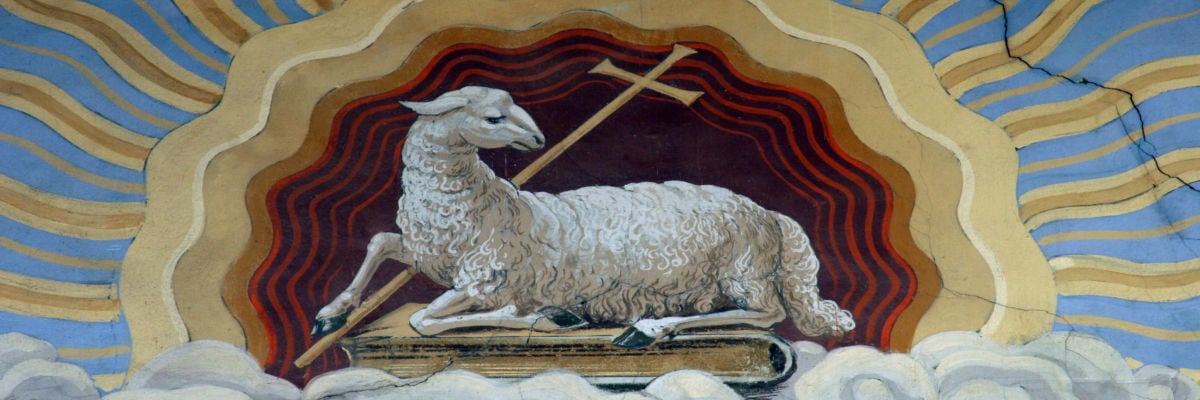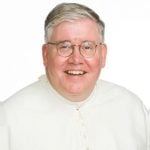
Homily for the Fourth Sunday of Easter, 2022
For the Lamb who is in the center of the throne will shepherd them.
-Rev. 7:17
“The Father and I are one.”
What strange things we are told in today’s lessons from the inspired pen of St. John, called “the Theologian,” or “Divine” in Christian tradition.
They might not sound so strange to us today, since we are used to the Savior’s being called “the Lamb of God” and “the Good Shepherd.” We also name him the “Son, of one substance with the Father.”
But . . . how does a lamb become a shepherd? A lamb is weak, helpless, and of limited intelligence, and a mere animal, but a shepherd is intelligent and provident and skilled at guiding his sheep, and he is a human being, a rational animal. Even more, a father and son possess the same nature, yes, but how could they be of the same substance, the same single being, while the one is the principle of the other?
When things that are contrasted and distinct are united, we wonder at the reasons, and this wonder is indeed the beginning of our deeper life of faith. Today we will not explain how all these amazing things can be, but we will seek a glimpse of what they mean to us and what they do for us.
As we recall the Good Shepherd today, as we do in every Easter season, and as we likewise observe the annual world day of prayer for vocations (and, as a little spoiler, let me add, as we are in the midst of Mary’s month of May), let us hear the words of a great and good shepherd and a holy priest. When he was only nine years old in the Italy of the nineteenth century when, as today, the Church had many enemies within and without, St. John Bosco had the following dream which he described in these words:
I dreamed that I was in the midst of a multitude of wolves, goats, kids, lambs, sheep, rams, dogs, and birds. The whole menagerie raised an uproar, a bedlam, or better, a commotion that would have frightened even the bravest man. I wanted to run away, when a Lady, dressed as a shepherdess, beckoned me to follow her and accompany the strange flock She was leading. We wandered aimlessly, making three stops along the way, at each of which many of those animals changed into lambs, so that the number of lambs continually increased. After a long trek, I found I was in a meadow, where those animals were grazing and frolicking, making no attempt to bite each other.
I was exhausted and wanted to sit by the roadside, but the shepherdess invited me to keep walking. A short distance away, I came upon a large playground surrounded by porticoes, with a church at one end. Here I noticed that four fifths of those animals had become lambs. Their number was now very large. At that moment many young shepherds came to watch over them, but they remained only a short time and walked off. Then a marvelous thing happened: many lambs turned into shepherds, and they, in increasing numbers, took care of the flock. When the shepherds became too many, they parted and went elsewhere to herd other strange animals into pens.
Savage animals into lambs, lambs into shepherds, who make more lambs who in turn become shepherds, under the guidance of the mother of the Good Shepherd, a shepherdess herself.
You see, today’s readings are about the vocation of the shepherd; they are about those who are called to lay down their lives for their sheep; that is, they are about sacrifice. They are about Fatherhood in its deepest sense.
Jesus is the Lamb who was slain in sacrifice, but a lamb who now guides and rules as the Shepherd of the flock. He takes away the sins of the world by his sacrifice, made present at Mass under the appearances of bread and wine. This means he transforms us by his nourishing and healing sacraments from being poor sinners into being, not only lambs of his flock, but real sons of God as he is. He does this by the grace he pours out on us here in the green pastures of our Catholic worship, as the priest shepherd we call “Father” proclaims, “Behold the Lamb of God.”
Fatherhood, Father? Today is Mother’s Day! Why not talk about mothers? But I am in fact talking about mothers, as was John Bosco. You see, he was reared by his mother, a widow, and he never knew the care of his own father. And yet is was through her and through his closeness to the mother of Jesus who accompanies his dream, that he found the grace to be a man, a true father to thousands of young men. The dream was the story of his life; he founded a congregation of priests and brothers whose work was the care of young men, and he quickly was venerated as the patron of youth upon his death. Yet his story is also the story of the Church, founded by God and Mary’s son, the Good Shepherd, the Lamb of God.
We Catholics must break loose from the sadness and discouragement and suspicion caused by the horrible scandals which have occurred over the years. Let us look with confidence to the Lamb upon the Throne, to the Son of the Eternal Father, to the Good Shepherd who will heal us and raise us up with the help of his mother’s intercession.
The Church will be healed by fostering new and many vocations to the priestly life. She will be healed by a renewed devotion to the mother of the Good Shepherd and mother of the Church. Her enemies will become her own flock, and even more, they will become her friends and brethren. Sooner or later this will happen, and then, we have been told, God will “wipe every tear from our eyes.”
The very language and the simple images used in our profession of faith teach us that God can and will unite what is contrary and divided and bring all to safety and peace. We may not understand how he works this more-than-magic in our hearts, but he does. Suffice it to say that staying close to the Eucharistic Lamb of God and to his holy mother, and holding firmly to the primacy of family life (which means being true men and true women) will bring this about. We have only to believe and persevere, in spite of all the madness of the media, the wolves and predators of entertainment and politics. The Lamb on the throne shall conquer!
When all those whom she loves are happy in themselves and in each other, only then is a mother happy herself. Her love goes out, inspires, seeks not so much to control or correct, as to encourage and inspire. Mary is such a mother, and so should our own mothers be. Then there will be many good fathers and shepherds, and many good children, and sheep.
By God’s good grace, may the mothers of today help to inspire men to seek true fatherhood—even the fatherhood of the priestly life in the likeness of the Good Shepherd the Son of Mary, the happy and glorious Mother of us all.



